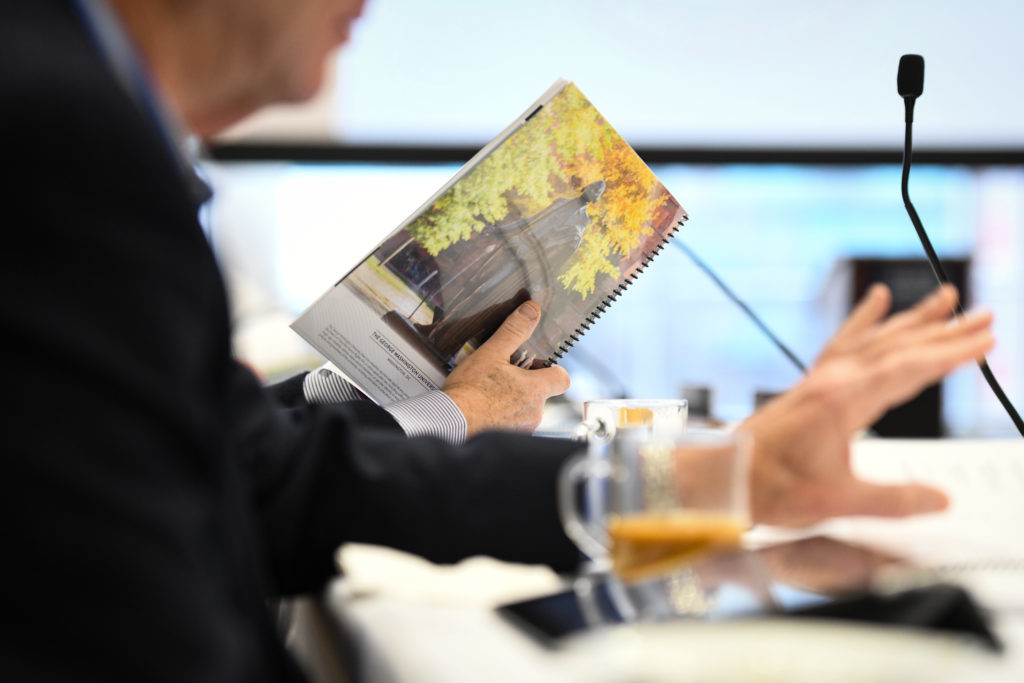An outside team of faculty and administrators criss-crossed campus last week to meet with hundreds of community members as part of an effort to ensure GW is following national higher education standards.
A seven-person team of experts from peer schools came to evaluate and observe all aspects of GW – one of the final phases of the two-year-long process of ensuring that GW is reaccredited. Officials said they are confident GW met the expectations of the team, though a full report will be presented this summer by the Middle States Commission on Higher Education, GW’s accrediting body.
Since 2016, an internal steering committee, consisting of administrators and faculty has overseen the accreditation process. Last fall, the committee released a 110-page self-study assessing nearly every aspect of the University and making recommendations on everything from reviewing the faculty conflict of interest policy to ensuring Human Resources is able to make hires more quickly.
During their four days at GW, which concluded Wednesday, the external review team met with “hundreds” of people including University President Thomas LeBlanc, Provost Forrest Maltzman, every school dean, faculty based on every campus, student leaders, financial directors and members of the Board of Trustees, Faculty Senate and the faculty advisory committee for online education.
The team, which was overseen by Middle States, compared their on-the-ground observations to GW’s self-study. The team also assessed the University based on seven key standards, including non-academic support and effective administrative leadership, according to GW’s self-study.
“They don’t want any institutions to sit on their laurels and never try to improve,” Maltzman said, referring to Middle States. “What they really care a lot about is whether or not we are making consistent regular efforts to assess what we are doing and to improve what we are doing.”
Before leaving campus, the review team held a forum with administrators in the Marvin Center Wednesday.
Maltzman used the mantra “‘are we just doing it or are we doing it right?’” to describe the process, which he said requires all members of the University community to reflect and evaluate their performance.
The committee was able to meet with anyone they wanted at the University in private meetings and town hall-style discussions, he said.
“When an accrediting body comes in, they are given access to everything. Anybody they want to speak to, any document they want to see. Anything. And they have gone through every single one of those things,” he said.
GW’s goals include creating a strategic vision for online programs, improving the timeliness of feedback professors provide to students and expanding international student recruitment to more countries, according to the self-study. The self-study does not specify how these goals will be achieved.
Maltzman said the Middle States team reviewed a dramatically different University a decade ago. This is the first accreditation process that will evaluate the Corcoran School of the Arts and Design as a part of GW – the University absorbed the school in 2014 – and the first time the commission has looked at online learning, a growing part of GW’s educational offerings.
Maltzman declined to discuss findings in these areas because the process is not yet complete.
Paul Duff, a religion professor and co-chair of the reaccreditation steering committee, said GW’s self-study gave the review team information on faculty and administrators that have been involved in the University’s progress over the last decade.
Last fall, the committee identified University strengths – including support for international student and career services – and weaknesses, including a lack of diversity among the international student body and a lagging six-year graduation rate.
“I think it’s their phrase, they call for a ‘culture of continuous improvement’ at institutions — it’s what they want,” he said.
Cheryl Beil, the associate provost for academic planning and assessment and the other co-chair of the steering committee, said Middle States will publish a private report in the next two weeks, allowing GW to contest factual errors and present a final assessment at the commission meeting in June.
“We are in very good shape, and the committee was complimentary about what they saw. We expect a positive outcome,” she said.
Wake Forest University Provost Rogan Kersh, the chair of the Middle States review committee that visited GW last week, said he cannot discuss the review team’s findings or discuss specific interactions, but he felt positive about GW based on his visit.
“Our impressions were highly positive,” he said. “Particularly impressed with GW students.”





